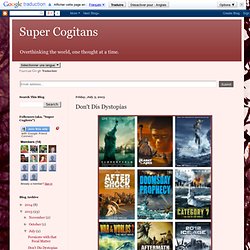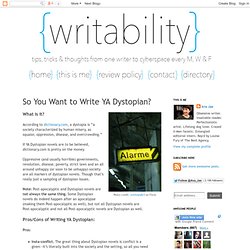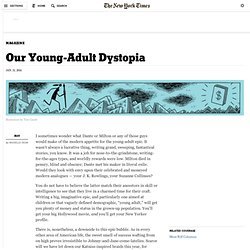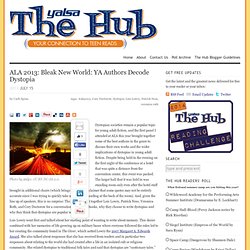

Don't Dis Dystopias. Hello, dear super cogiters, and welcome to the end.

This week we're overthinking dystopias, particularly dystopic novels written for young adults. In case you haven't been to a bookstore or seen a movie recently, aside from vampires and zombies, most teens these days are reading about the end of the world, or rather, what happens after the end of the world as we know it. And here's a quick pause for a disaster/armageddon/invasion montage set to that R.E.M. song that I bet is stuck in your head now. Okay, back to business. Although for some reason it is quite fun to watch major cities being apocalyptically destroyed in various ways while listening to angry music from the '80s, earth-changing tidal waves and explosions aren't really the subject of this post. Dystopias also deal with constructed communities, though not of the bright, shiny, happy variety.
Take, for instance, the only dystopia that made it onto my Top Ten YA Novels list: Uglies, by Scott Westerfeld. Okay, sappy part over. So You Want to Write YA Dystopian? What is it?

According to dictionary.com, a dystopia is “a society characterized by human misery, as squalor, oppression, disease, and overcrowding.” If YA Dystopian novels are to be believed, dictionary.com is pretty on the money. Oppressive (and usually horrible) governments, revolution, disease, poverty, strict laws and an all around unhappy (or soon to be unhappy) society are all markers of dystopian novels. Though that’s really just a sampling of dystopian issues. Note: Post-apocalyptic and Dystopian novels are not always the same thing.
Pros/Cons of Writing YA Dystopian: Pros: Insta-conflict. I say this every time, and I will continue to do so: you must read the genre you write in. Knowing your category and genre is key to adding something meaningful to the market. Helpful Links: Do you enjoy reading or writing YA Dystopian novels? I Am President Snow. The Hunger Games and the teenage craze for dystopian fiction. Dystopia Meme. Our Young-Adult Dystopia. Photo I sometimes wonder what Dante or Milton or any of those guys would make of the modern appetite for the young-adult epic.

It wasn’t always a lucrative thing, writing grand, sweeping, fantastical stories, you know. It was a job for nose-to-the-grindstone, writing-for-the-ages types, and worldly rewards were low. Milton died in penury, blind and obscure; Dante met his maker in literal exile. Would they look with envy upon their celebrated and moneyed modern analogues — your J. You do not have to believe the latter match their ancestors in skill or intelligence to see that they live in a charmed time for their craft. There is, nonetheless, a downside to this epic bubble. It would be a fine thing to be able to declare “Divergent” worthy of its success. Sound familiar at all? Curiously, it is the kind of flat that actually made me angry as I read it.
It isn’t hard to see what has brought us here. But the wolves are everywhere. Anyone who writes at all can only sympathize with Roth. Lauren Millikan's bookshelf: dystopia (showing 1-30 of 33) (sorted by: date read) 2013: Bleak New World: YA Authors Decode Dystopia. Photo by 96dp1.

CC BY-NC-SA 2.0. Dystopian societies remain a popular topic for young adult fiction, and the first panel I attended at ALA this year brought together some of the best authors in the genre to discuss their own works and the wider implications of dystopias in young adult fiction. Despite being held in the evening on the first night of the conference at a hotel that was quite a distance from the convention center, this event was packed. The larger hall that it was held in was standing room only even after the hotel staff brought in additional chairs (which brings me to my disclaimer that some quotes may not be entirely accurate since I was trying to quickly take notes while standing at the back of the room).
Lois Lowry went first and talked about her starting point of wanting to write about memory. Patrick Ness, author of the Chaos Walking trilogy, followed and presented what he viewed as the five big questions of dystopia, starting with “Why is dystopia so popular?”